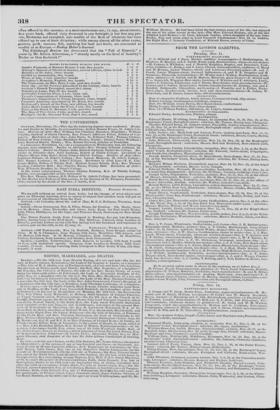SPECTABILIA.
CHANGE OF POLITICAL. BCGBEATIS.—The politicians who alarm themselves and would alarm others with the idea of the Russians conquering the world. may derive a hint from the similar apprehensions entertained by our forefathers of the very people who are now fighting for their own inde- pendence. " The Turk," says Lord Bacon, "is the most potent and most dangerous enemy of the faith."—"J.Reusner," says Bayle, Art..Mahomet, has gotten' many volumes of addresses to the Christian princes to exhort them to unite their forces against the infidels."—" I do hear," says Pepys in his Diary, "that the Turk be making dreadful progress in Hungary ;—the Lord pre- serve us!" Think of country gentlemen frightening themselves over the:r newspapers with forebodings of an invasion by the Turks ! Yet their alarm was more reasonable than that which has been recently expressed in print of the Russians.
CASTES.—The institution of castes, or hereditary professions, has not, as N very commonly supposed, been confined to Egypt and India; it has ex- tended to all Asia, to Greece, England, and America. Castes seem to have originated in the uninstructed efforts of early legislators to perpetuate and extend the advantages that were perceived to result from the separation of employments. They are the clumsy machinery of a rude state of society, and are laid aside as civilization advances.
The influence of castes among the Hindoos appears to have been greatly overrated by former writers, and by all but the most recent travellers. Bishop Heber in his Journal, Mr. Rickards in his pamphlet on India, and Mr. Colebrook in a paper in the Asiatic Researches, have especially contributed to spread juster views of the condition and capabilities of this immense fa- mily of the human race. It is not true that their station is irrevocably fixed by impassable walls of separation : on the contrary, there appears to be a considerable facility to the intermixture of castes, and no end to the subdi- visions of classes. It is not true that their habits are unchangeable. It is not true that there is aught in the nature, the habits, or even the supersti- tions of the native Indians, to hinder them from becoming, most extensive consumers of the manufactures of Britain. Their poverty, and the restricted state of the Indian trade, are the main obstacles. There is a useful little article on this subject in the Ninety-fifth' Number of the Edinburgh Review.
Nothing seems more generally mistaken than the supposed prohibition of animal food to the Hindoos. Many Brahmins eat both fish and kid. Tie Rajepoots, besides these, eat mutton, venison, or goat's flesh. Some castes may eat anything but fowls, beef, or pork, while pork is with others a fa- vourite diet, and beef only is prohibited. 1 have always heard, and fully believed, till I came to India, that it was a grievous crime, in the opinion at the Brahmins, to eat the flesh or shed the blood of any living creature what- ever. I have m.-self seen Brahmins of the highest caste cut off the head of gnats as a sacrifice to Doorga ; and I know from the testimony of Brah- mhis, as well as from other sources, that not only hecatombs of animals are often offered in this manner, as a most meritorious act ; (a raja, about twenty- five years back, offered sixty thousand in one fortnight ;) but that any per- shn, Brahmins not excepted, eats readily of the flesh of whatever has been offered up to one of their divinities ; while among almost all the other castes, mutton, pork, venison, fish, anything but beef and fowls, are consumed as readily as in Europe.-Bishop Heber's Journal. The Edinburgh Review has discovered that the " Fall of Nineveh," a poem by Mr. Edwin Atherstone, is "already nearly on the level of Southey's Madoc or Don Roderick !"



















 Previous page
Previous page